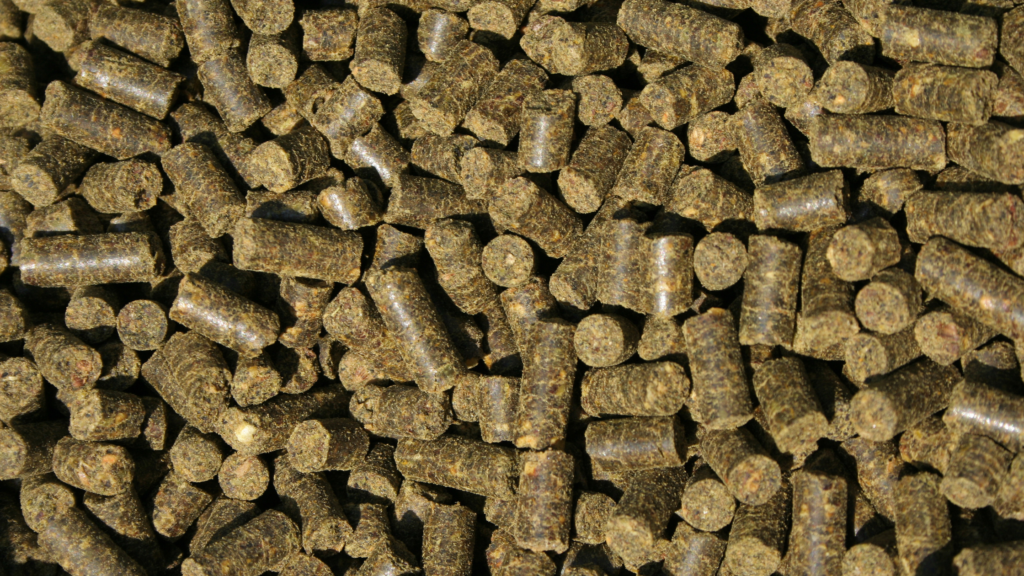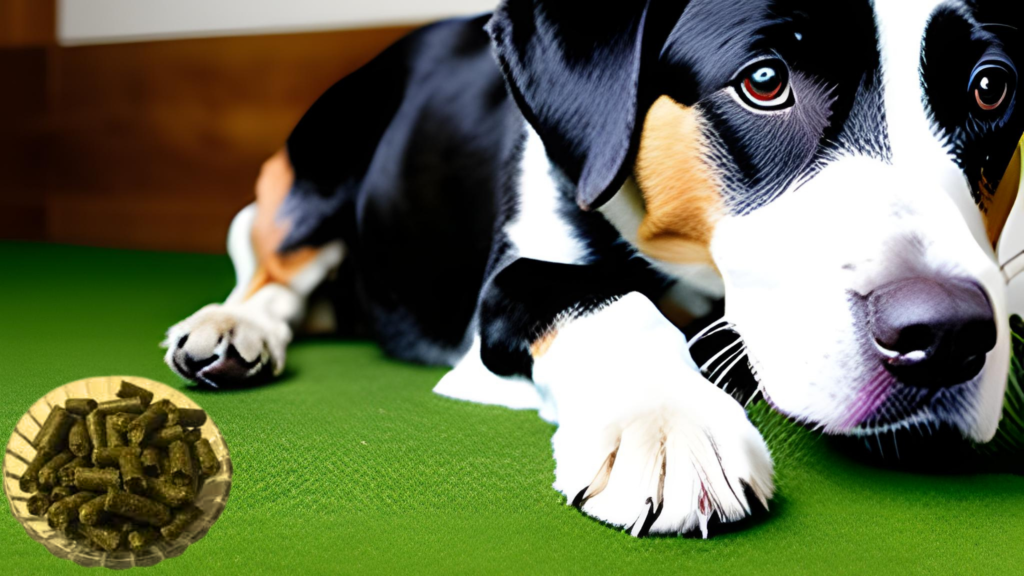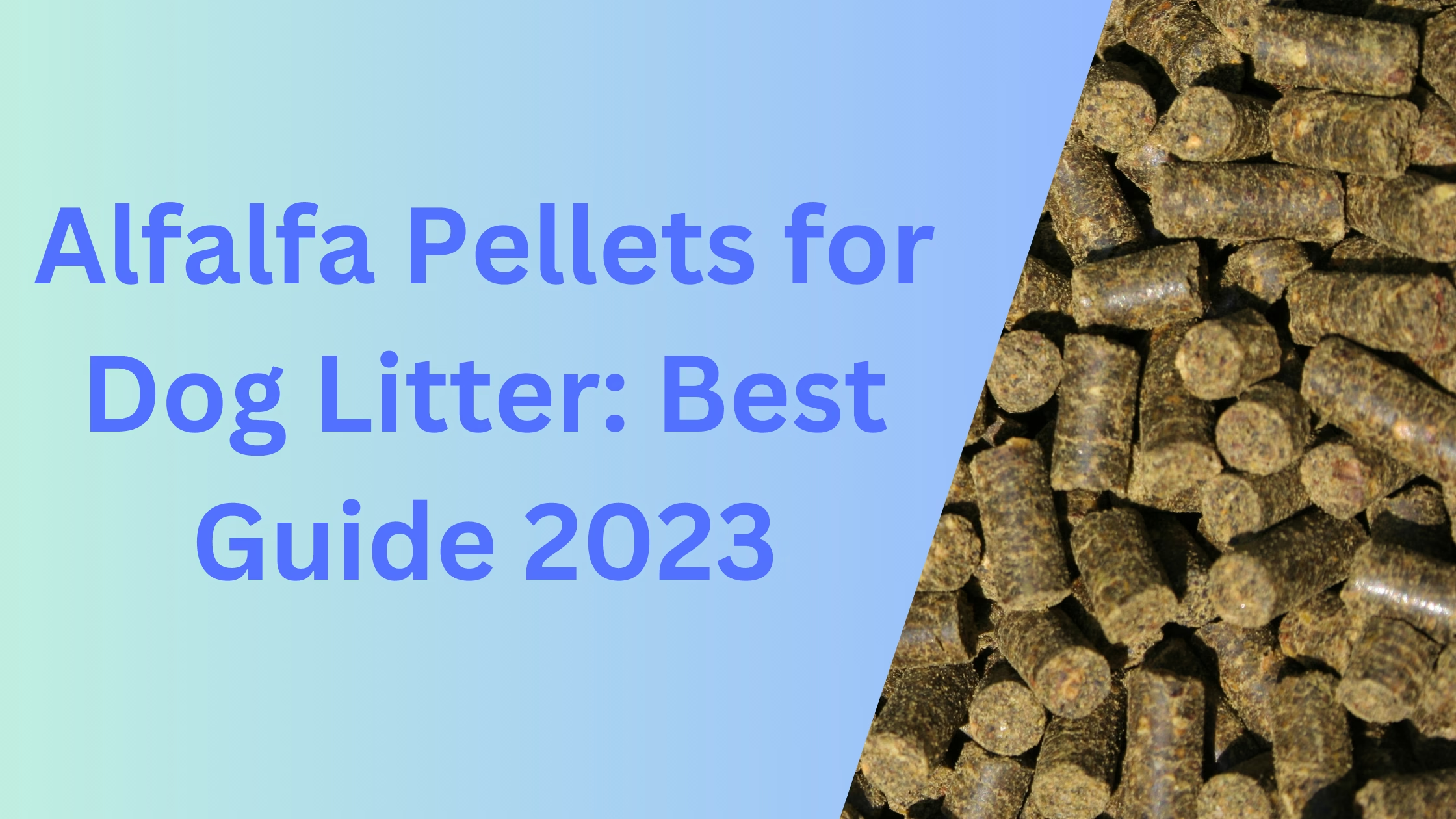Can I use alfalfa pellets for dog litter? Yes, alfalfa pellets can be used as dog litter. They are a natural, safe, eco-friendly option that provides excellent odor control and high absorbency.
As pet owners become more environmentally conscious, many seek eco-friendly options for their furry friends.
One such option is alfalfa pellets, a natural and sustainable alternative to traditional dog litter.
Not only are they biodegradable and easy to dispose of, but they also provide a host of benefits for both you and your pup.
Also Read : Why Is My Dog Shaking After Vaccination? Best Guide
What are Alfalfa Pellets, and How Do They Work as Dog Litter?

Alfalfa pellets are made from dried and compressed alfalfa hay, a legume rich in nutrients and commonly used as animal feed.
When used as dog litter, the pellets absorb moisture and odor, making them an effective alternative to traditional clay or chemical-based litter.
Alfalfa pellets work by absorbing urine and drying out feces, which helps to control odors and reduce the amount of waste that needs to be disposed of.
The pellets also provide a soft and comfortable surface for dogs to walk and lie on, which can be especially beneficial for dogs with sensitive paws or arthritis.
In addition to their absorbent properties, alfalfa pellets are biodegradable and can be easily disposed of in a compost bin or used as fertilizer for plants.
This makes them an eco-friendly option that is both sustainable and effective for dog owners looking for a more natural alternative to traditional dog litter.
Benefits of Alfalfa Pellets for Dog Litter
There are several benefits of using alfalfa pellets as dog litter:
- Natural and Safe: Unlike traditional litters that may contain chemicals or other harmful additives, alfalfa pellets are a natural and safe option for your dog. They are made from 100% plant-based materials and do not contain any artificial fragrances or dyes.
- Highly Absorbent: Alfalfa pellets are highly absorbent and can absorb up to four times their weight in moisture. This means they are effective at controlling odors and reducing waste that must be disposed of.
- Eco-Friendly: Alfalfa pellets are a sustainable and eco-friendly option for dog owners. They are biodegradable and can be easily disposed of in a compost bin or used as fertilizer for plants.
- Cost-Effective: Alfalfa pellets are a cost-effective alternative to traditional dog litter. They are often less expensive than other types of litter and can last longer, which can help to save money in the long run.
- Comfortable for Dogs: Alfalfa pellets provide a soft and comfortable surface for dogs to walk and lie on. This can be especially beneficial for dogs with sensitive paws or arthritis, as it can help to reduce joint pain and discomfort.
Overall, using alfalfa pellets as dog litter provides numerous benefits for you and your furry friend. They are natural, safe, highly absorbent, eco-friendly, cost-effective, and provide a comfortable surface for your dog to rest on.
Also Read : Rattlesnake Vaccine for Dogs: Pros and Cons of Protecting Your Bestie
How to Use Alfalfa Pellets as Dog Litter

Using alfalfa pellets as dog litter is a simple process. Here are the steps to follow:
- Prepare the litter box: Start by cleaning and preparing your dog’s litter box. Remove any old litter and clean the box thoroughly with soap and water.
- Add the alfalfa pellets: Pour a layer of alfalfa pellets into the bottom of the litter box. The depth of the layer should be about 1-2 inches.
- Monitor the moisture: As your dog uses the litter box, monitor the moisture level of the pellets. When the pellets become saturated, they will break down and turn into a sawdust-like material. This is an indication that it’s time to add more pellets.
- Scoop out solid waste: Use a scoop to remove any solid waste from the litter box. Alfalfa pellets do not clump like traditional litter, so you must remove the waste manually.
- Dispose of waste: Once you have removed the solid waste, dispose of it in a trash bag. Alfalfa pellets can be composted, but it’s best to avoid composting pet waste.
- Add more pellets: Add more alfalfa pellets to the litter box to maintain a depth of 1-2 inches.
- Clean and replace: Clean the litter box and replace the pellets completely every 2-4 weeks, depending on how often your dog uses the box.
Using alfalfa pellets as dog litter is an easy and effective way to provide your furry friend with a comfortable and natural litter box experience. With a little monitoring and maintenance, you can keep your dog’s litter box clean and fresh without harmful chemicals or artificial additives.
Tips for Making the Transition to Alfalfa Pellets
Transitioning to alfalfa pellets as dog litter may take time and patience. Here are some tips to make the process smoother for you and your furry friend.
- Start gradually by mixing a small number of alfalfa pellets into your dog’s current litter. Gradually increase the number of pellets daily until your dog fully transitions to the new litter.
- Observe your dog’s behavior: Pay attention to how your dog reacts to the new litter. Some dogs may take to it immediately, while others may need time to adjust. If your dog seems hesitant to use the new litter, try placing some of their old litter on top of the alfalfa pellets to help them transition.
- Provide plenty of positive reinforcement: Encourage your dog to use the new litter by providing plenty of praise and treats when they do. This will help to reinforce positive behavior and make the transition easier for your dog.
- Be patient: It may take time for your dog to adjust to the new litter fully. Be patient and consistent with the transition process, and continue to provide positive reinforcement to encourage your dog to use the new litter.
- Consider mixing with other natural materials: Some dog owners find that mixing alfalfa pellets with other natural materials, such as wood shavings or recycled paper, can provide a more comfortable and absorbent litter. Experiment with different combinations to find the right balance for your dog.
With these tips, you can help transition to alfalfa pellets as dog litter, a smooth and successful process for you and your furry friend.
Cleaning and Maintenance of Alfalfa Pellet Dog Litter
Cleaning and maintaining alfalfa pellet dog litter is a relatively simple process. Here are some tips to help keep your dog’s litter box clean and fresh:
- Scoop daily: Remove any solid waste from the litter box with a scoop or a small shovel. This will help to prevent the litter box from becoming too dirty or smelly.
- Add new pellets: As the pellets break down and turn into a sawdust-like material, add new pellets to the litter box to maintain a depth of 1-2 inches.
- Monitor moisture: Check the moisture level of the pellets regularly. If the pellets become too saturated, they may emit an unpleasant odor. Adding fresh pellets as needed can help to control odors and maintain a clean litter box.
- Clean the litter box: Every 2-4 weeks, empty it completely and clean it with soap and water. Let the litter box dry completely before adding fresh pellets.
- Dispose of used pellets: Alfalfa pellets can be composted or used as fertilizer for plants. If you choose to compost them, separate the composted pellets from any pet waste, as pet waste should not be used in garden compost.
- Store the pellets in a dry place: Keep the unused pellets in a dry place to prevent them from absorbing moisture and becoming unusable.
Following these simple tips, you can maintain a clean, fresh litter box for your furry friend. Alfalfa pellet dog litter is a natural and safe option with numerous benefits, including excellent odor control, high absorbency, and eco-friendliness.
Also Read : Do Dogs Have Uvulas? Unveiling the Mystery
FAQs about Alfalfa Pellet for Dog Litter
Is it safe for a puppy to eat alfalfa pellets?
It is not recommended for puppies to eat alfalfa pellets, as they are not meant to be ingested and may cause digestive issues. Monitor your puppy when using alfalfa pellets as litter and discourage them from eating them.
Can I use alfalfa pellets for puppy potty training?
Yes, alfalfa pellets can be used for puppy potty training. They are highly absorbent and help control odors, making them an effective and eco-friendly option for training your puppy to use a litter box.
Can horse pellets be used for dog litter?
Yes, horse pellets from compressed wood fibers can be used as dog litter. However, make sure to choose pellets free of additives or chemicals that could harm your dog.
What are Standlee alfalfa pellets?
Standlee alfalfa pellets are a brand of alfalfa pellets made from premium quality alfalfa hay. They are highly absorbent and provide excellent odor control, making them popular among pet owners.
What is a puppy litter box?
A puppy litter box is a small container filled with litter or absorbent material designed for puppies to use as a potty area. It is often used as an alternative to outdoor potty training or for puppies who cannot go outside due to age or health reasons.
Are alfalfa pellets safe for puppies?
Yes, alfalfa pellets are safe for puppies to use as litter. They are made from natural plant fibers and do not contain any harmful chemicals or additives. However, monitor your puppy when using alfalfa pellets and discourage them from eating them.
What pellets should I use for dog litter?
There are several options for dog litter pellets, including alfalfa, compressed wood, or recycled paper pellets. Choose pellets that are natural, safe, and free of harmful chemicals or additives.
Conclusion: Is Alfalfa Pellet for Dog Litter Right for You and Your Dog?
Overall, alfalfa pellet dog litter can be a great option for pet owners looking for a natural, eco-friendly, and effective alternative to traditional dog litter.
Alfalfa pellets are highly absorbent, provide excellent odor control, and are safe for dogs. However, it’s important to remember that alfalfa pellets may not be the best choice for every dog and every situation.
For example, if your dog has a history of eating non-food items or has sensitive skin, alfalfa pellets may not be the best option.
It’s also important to properly transition your dog to alfalfa pellets and maintain the litter box regularly.
Overall, alfalfa pellets are worth considering if you’re looking for an eco-friendly and natural dog litter option.







